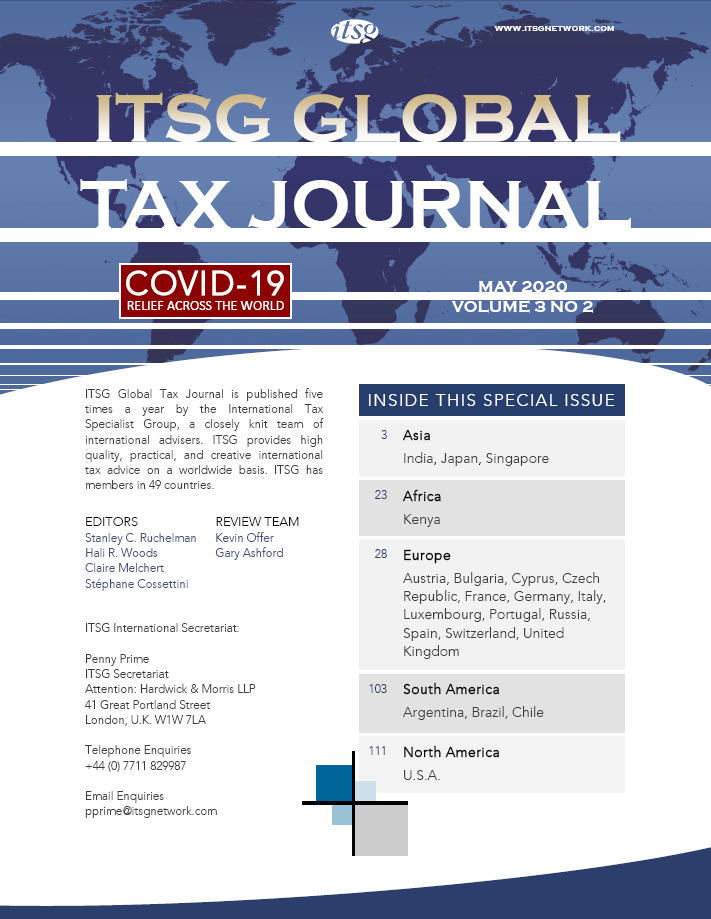A summary of the emergency regulations issued by the Bulgarian public entities, regarding tax, labor and compensation legislation as of 27 March 2020.
INTRODUCTION
On 24 March 2020, the “Measures and Actions During the State of Emergency Act” was promulgated in the State Gazette and entered retroactively into force as of 13 March 2020.
On 25 March 2020, the Government determined that more than BGN 2 billion (€1.02 billion) would be allocated from the budget for economic measures:
- The Prime Minister has announced that over 60% of the employee’s remuneration in the affected sector will be covered by BGN 1 billion state funding.
- The capital of the Bulgarian Development Bank (B.D.B.) will be increased by BGN 500 million (€255 million) to guarantee loans taken by companies from private banks.
- BGN 200 million (€102 million) from B.D.B. through commercial banks will be given for unsecured consumer loans up to BGN 1,500 (€765) for furloughed employees who are on unpaid leave.
- BGN 500 million (€255 million) for remuneration of health officials, police and military.
V.A.T. AND OTHER TAX PAYMENTS
Will the deadline for V.A.T. declaration and payment be changed?
No. The deadline for declaration and payment of V.A.T. will not be changed according to the National Revenue Agency.
If the corporate tax declaration has already been filed, can the payment date be deferred?
Yes, the payment date for corporate tax will be extended for those who have already submitted the annual declarations.
Will the date for declaring and paying national taxes and social security contributions during the state of emergency be deferred during the state of emergency?
Yes, there will be deferrals for declaring and paying national taxes and social security contributions as follows:
- The deadline for filing corporate tax declarations has been extended until 30 June 2020.
- The deadline for payment of corporate tax has been extended until 30 June 2020.
- For 2020, advance payments based on the estimated tax profit for 2020 are made, taking into account the following features:
- If the annual tax declaration for 2019 has already been submitted, adjustments to the amount of the advance payments by 15 April 2020 should be made by the declaration.
- If the annual tax return for 2019 was not submitted by 15 April 2020, it must be submitted by that date, by submitting only portion related to advance contributions. Adjustments to the amount of the advance contributions are made by the declaration.
- Adjustments to the advance contributions made by the declaration can be used after submission of the declaration.
- The deadlines for the advance payments for 2020 are as follows:
- The monthly advance payments for the first quarter (January, February and March) of 2020 are due by 15 April 2020.
- The monthly advance payments for the months from April to December 2020, are due by the 15th day of the month to which they refer.
- The quarterly advance payments for the first and second quarters of 2020 are due by the 15th day of the month following the quarter end.
- No quarterly advanced payment is made for the fourth quarter.
- The deadline for the submission of the Annual Activity Statement (A.A.S.) has been extended to 30 June 2020.
- The deadlines for declaring and paying various miscellaneous tax, such as the tax on expenses under the Corporate Tax Act, the tax on the revenues of budgetary enterprises, the tax on certain income under the Gambling Act, and the tax on the operation of ships have all been deferred until 30 June 2020.
- The deadlines for filing the annual income tax declaration for natural persons engaged in business as sole proprietors, including farmers, has been deferred to 30 June 2020.
During the state of emergency all enforcement activity under the Tax and Social Insurance Procedure Code are suspended. However, interest on underpayments continues to accrue. In addition, tax liabilities can be secured enforcement proceedings. Taxpayers wishing to make payment can authorize a transfer of receivables, cash in banks, receivables, and contents of value in vaults and safes. However, there will be no public auctions and no takeover proceedings.
In addition, no enforcement cases can be originated by public bailiffs except in particularly important cases.
JOB RETENTION PROGRAM
Overview
The goal of the job retention schemes is that the state is covering 60% of the remunerations of employees who would otherwise lose their jobs. This will be covered, through the “Unemployment Fund.” In return for this funding, employers are obliged to retain their employees and cover the remaining 40% of the remuneration.
To be eligible for the benefits, a company must have reduced its headcount by 50% or more from the employee headcount on the date the state of emergency was declared and a shelter-in-place order was issued. At least 50% of the covered employees must work in one of 19 identified economic activities listed in the order.
Applicants for relief must not have made redundancies throughout the period in which compensation is received. That period lasts up to three months and the decree retroactively came into effect as of 13 March 2020. If the company wants full compensation, it must retain staff for three months from that date. Companies should be up to date with regard to taxes and social security contributions, should not already be in receipt of emergency funding from European programs or from the national budget in Bulgaria, and should not have committed any breach of the labor legislation.
No requirement exists under which 50% or more of the employees must be engaged in the activities concerned. Similarly, there is no obligation for the employees to remain employed for three months thereafter.
Labor Sectors of Workforce
Companies with employees working in the following sectors may qualify for relief under this program:
- Big shopping center retailers other than food, beverage, tobacco, motor vehicles and motorcycles retailers
- Different types of passenger transport
- Hotels and other similar accommodation
- Tourist and other short-term accommodation
- Restaurants and fast food establishments
- Drinking establishments
- Movie projection
- Travel agency and operator activity; other travel and booking activities
- Artistic and creative activity
- Other cultural activities
- Sports and other activities related to leisure and recreation
- Maintaining good physical condition.
- Manufacturing, except tobacco, coal mining, refined petroleum products, chemical products, pharmaceuticals and computer equipment
- Construction
- Non-shopping center retailers other than food, beverage, and tobacco retailers
- Publishing activity
- Public Relations
- Advertising and sociological agencies.
Both local and foreign enterprises may qualify for the relief. In particular employees on the payroll must work in one or more of the 19 sectors and economic activities. The applicant must have no tax obligations or mandatory social security contributions remaining unpaid at the time of the application and have not been declared bankrupt or are not in bankruptcy or liquidation proceedings. Employee headcount must remain employed for the entire period in which relief is received. If employees are furloughed, the period of furlough cannot last more than 15 days. Finally, the applicant must not have been found by a court to have violated applicable labor legislation.
Application Process
Applications for relief are submitted to the state employment offices. Applications should be accompanied by the following documents:
- An order direct to the employer to discontinue work under due to the state of emergency.
- A declaration that the applicant will maintain employment in the enterprise and that it will not dismiss employees for the period in which relief will be received.
- A list of workers whose salaries will be funded under the 60/40 formula.
- The applicant’s bank account with IBAN information.
A template is provided for required declarations. The approval process is relative short, and decisions are expected to be made within two working days for the submission of the application packet.
EMPLOYMENT LEGISLATION
During the State of emergency, amendments to the Labor Code require the employer to continue to pay compensation to employees during the suspension of the work processes. Nonetheless, the employer will retain the right to unilaterally take certain actions. It may assign the employee to work remotely. An explicit written order is required that specifies the new working conditions, such as the work, remuneration, and related specifications. In addition, the employer may establish part-time working hours for employees working full time, provided that the number of ours cannot be reduced by more than 50%. Finally, the employer may require employees to take paid annual leave during the emergency period.
SOCIAL SECURITY
The time limits for the payment of compulsory social security contributions by insurers will not be modified in order to preserve the rights of the persons insured and to guarantee the timely payment of the insurance benefits that become due, including pensions and temporary disability benefits and unemployment benefits.
The payment deadlines and the monthly advance contributions by the self-insured persons remain unchanged. The final social security contributions are paid by self-insured individuals on or before the deadline for filing the annual tax return under the Personal Income Tax Act.
BUSINESS RATES HOLIDAYS
Certain enforcement actions are suspended. As a result, interest and penalties, mandatory early payment, contract termination and seizure of property are suspended until the state of emergency is lifted. Enforcement measures under the Tax and Insurance Procedure Code are suspended, but the actions carried out remain valid.
In the case of private law obligations, all announced public sales and holdings have been suspended. No account preservation orders may be imposed on bank accounts of individuals, salaries, and pensions. No court orders may be obtained to require an inventory of property for businesses or individuals.
Managing authorities of European Structural and Investment Funds shall have the right to unilaterally amend agreements and to sign new ones under simplified rules, including without the publication of a call for proposals.
Original document can be found at: simbula.eu/en/cov19-4/

 Login
Login




















































